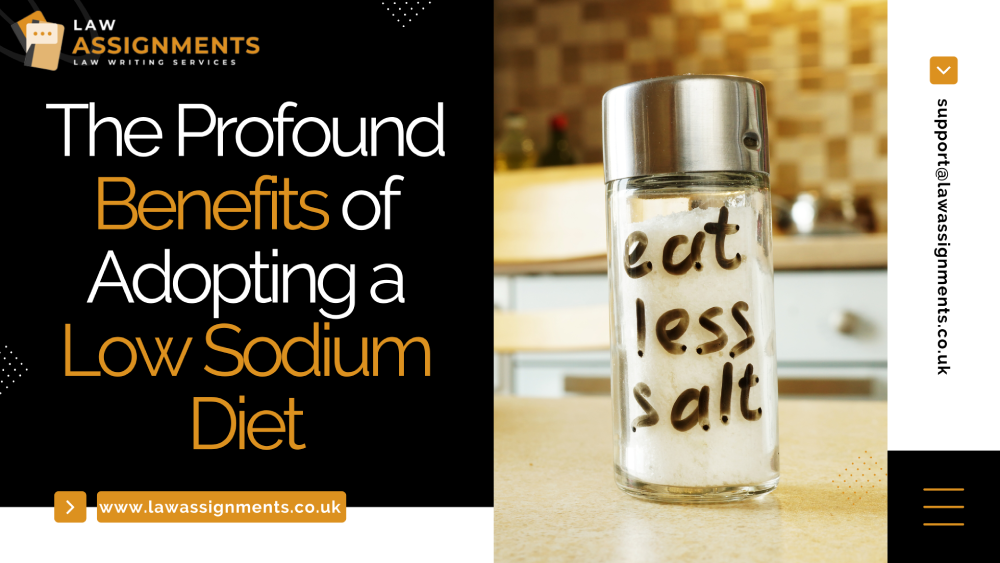The Profound Benefits of Adopting a Low Sodium Diet

In achieving optimal heart health, food choices play an important role. Among various dietary strategies, adopting a low-sodium diet has emerged as a powerful means of promoting cardiovascular health. This article explores the manifold benefits of adopting a low-sodium diet, highlighting how this dietary approach can support overall heart health. If you need information about a low sodium diet, the best law assignment help UK is here to provide comprehensive guidance on every aspect.
1: Understanding Sodium and Its Effects on Heart Health
The human body needs sodium for vital functions, but excessive use of it has negative effects on health, especially on the cardiovascular system. This section provides a basic understanding of the role of sodium in the body and introduces the connection between high sodium intake and heart health problems.
2: High Blood Pressure and Sodium Connection
Excessive sodium intake is a known contributor to high blood pressure, which is a major risk for heart disease. Unravel the complex relationship between sodium, blood pressure, and the development of hypertension, emphasizing the need for a proactive approach to managing sodium intake.
3: Lowered Blood Pressure: The Cornerstone of Heart Health
Discover how adopting a low-sodium diet can help lower blood pressure. Highlight the studies and evidence supporting the effectiveness of this dietary approach in reducing high blood pressure levels, thus reducing the risk of heart disease.
4: Protection Against Heart Disease
Consider the protection that low-sodium foods provide against various heart diseases. Discuss how limiting sodium intake can reduce the risk of conditions such as heart attack, stroke and heart disease, thereby promoting a resilient and healthy cardiovascular system.
5: Protecting The Health of Arteries
Explain the effects of a low-sodium diet on artery health. Discuss how low sodium levels help maintain the elasticity of blood vessels, preventing stiffness and narrowing associated with damage to the arteries. This section emphasizes the role of a low-sodium diet in preserving optimal blood flow.
6: Warmth and Fluid Balance
Examine the relationship between sodium and fluid balance in the body. Discuss how a low-sodium diet helps retain fluid, reduce edema, and reduce other complications associated with retaining excess fluid, especially in people with heart disease. There is a disease.
7: Improvement in Kidney Function
Discover the connection between sodium intake, blood pressure, and kidney health. Discuss how adopting a low-sodium diet can reduce stress on the kidneys, promote greater kidney function, and reduce the risk of kidney disease often associated with high blood pressure. Can go Can be reduced.
8: Increase in Heart Function
Consider the ways a low-sodium diet can positively affect heart function. Discuss how maintaining a balanced sodium intake helps the heart’s pumping performance, reduces the workload on the heart muscle, and supports long-term cardiovascular health.
9: Customizing a Low Sodium Lifestyle
Provide practical tips and strategies for people looking to adopt a low-sodium lifestyle. Discuss the importance of reading food labels, choosing fresh, whole foods, and practicing smart cooking practices to minimize sodium intake while maintaining taste and enjoyment.
Conclusion:
Summarize the key benefits described in the article, emphasizing the profound impact a low-sodium diet can have on heart health. Encourage readers to consider the long-term benefits of making informed food choices, ultimately contributing to a heart-healthy lifestyle. Strengthening this idea, we conclude that adopting a low-sodium diet is an effective and alternative step toward improving cardiovascular health.